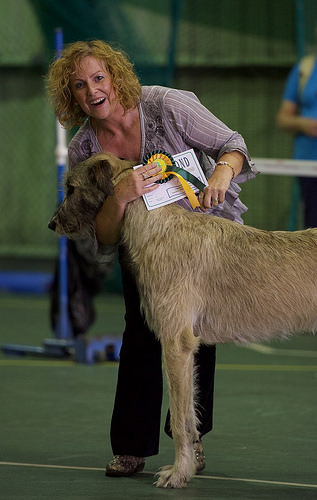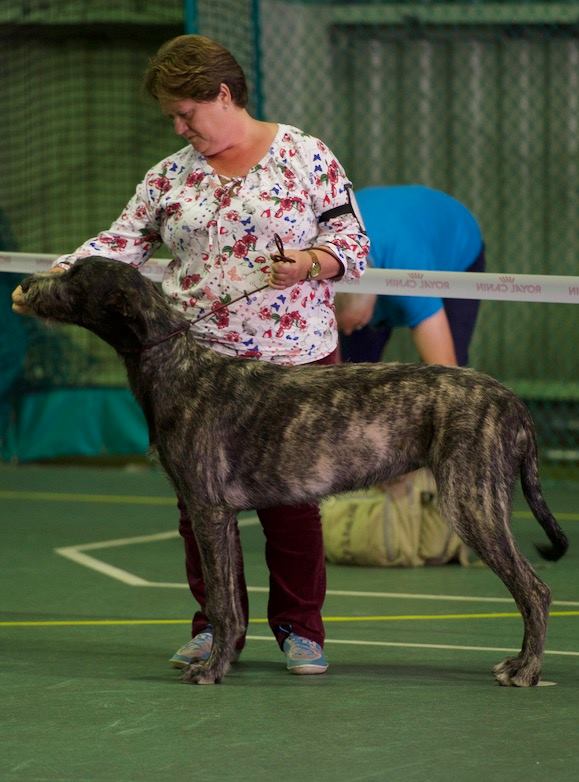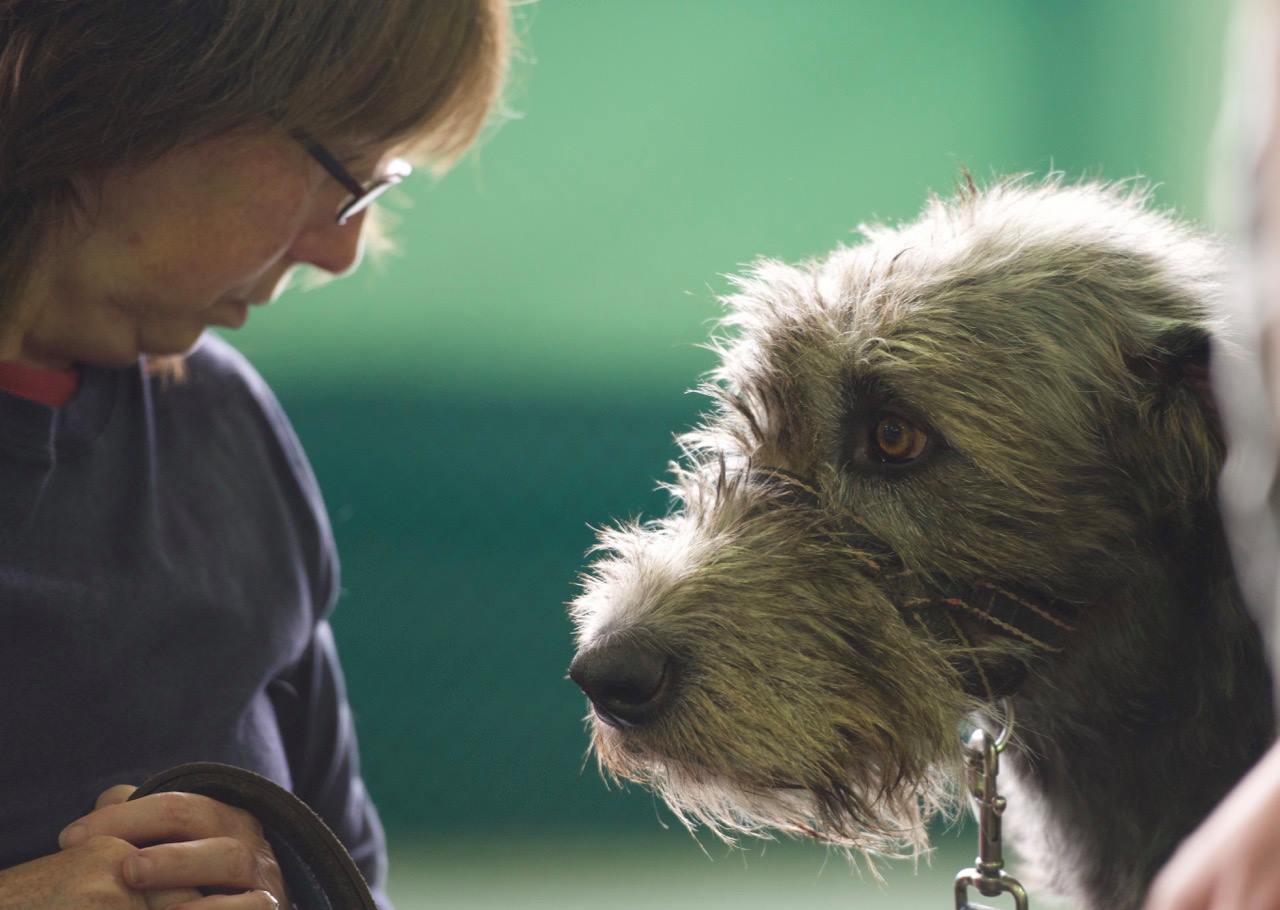It seems that heart testing and also publishing heart testing results has been a very popular topic of discussion the past couple of weeks. Here at Bonaforte we carried out one of our 6 monthly heart testing sessions a week ago, which was a great a few days, although very tiring and we managed to test over 45 dogs with the help of Dr Serena Brownlie. We were also delighted to have some of the students from Nottingham Vet School visit us to help out, as well as Siobhan Simpson and Professor Malcolm Cobb. Many Wolfhound owners will have been contacted by the students as they have conducted telephone interviews to complete questionnaires for DNA swabbed dogs as part of the heart research project being carried out in conjunction with the University of Nottingham. It was the Nottingham Vet School researchers and the students themselves that expressed an interest in attending a heart testing session, not just for the invaluable experience it provided observing Serena testing so many dogs, but also most of the students had had very little, if any, hands-on experience with Wolfhounds - so we gave them the ‘Full Monty’ and they thoroughly enjoyed it!
Some people reading this will also have seen recent discussions on Facebook regarding the publishing of heart test results. It is a topic that is becoming more and more prominent and now appears to be driven by owners and breeders rather than Breed bodies? Throughout the online discussions and also in private conversations with others, it became evident that some members of the Irish Wolfhound community were well informed on all aspects of the issue, but a large proportion of those involved are not fully aware of all sides of the ‘publish/not publish’ question. Added to that, a chat with friends in another Breed, who are looking to start a heart screening programme of their own, threw up the fundamental question of:
Q. “Why bother running a heart testing scheme for any Breed, are there any advantages to doing it?”
A. The simple answer to this fundamental question is, YES!
Here are our thoughts on the whole topic of heart testing/screening from the varying points of view of those involved;
From the dog's point of view it is a health check, carried out by a professional/expert in the field and so it provides the owner with information about the state of that dog's heart health and if it is done through a testing scheme rather than a referral to a cardiologist, then this same check is done at a substantially reduced cost to the owner. If any issues are detected then early diagnosis and continued monitoring is far more beneficial than either not knowing about the problem or not discovering a condition until it is very advanced. By picking up even small anomalies early on the dog can be monitored and treated accordingly (sometimes no treatment is ever required).
From the owner's point of view they will have an accurate picture of their dog's heart health and will be given initial advice by the cardiologist and then be treated by their own general practice vet, with a possible private referral to a cardiologist for some in-depth investigations or a treatment plan. Often owners in the position will continue also to come along to routine screening scheme at the same time as being treated by a cardiologist. Screening cardiologists running the scheme cannot advise owners in an ongoing case and they are not a 'cheap referral' option, but they are generally happy to perform a standard 3 stage check and feed the results into their data.
From a breeder's point of view it is vital that breeding stock is routinely checked to detect and potential issues and, if necessary, remove those dogs from their breeding programme as heart disease is an inherited condition. This may be a temporary or permanent removal, depending upon the results of continued testing, but just because a dog tests equivocal (or even abnormal in some cases) does not mean that the dog can never be used for breeding. Often dogs with anomalies (which would be tested as 'Equivocal') will test 'Normal' on subsequent screening and for that reason the 'Equivocal' category should be thought of as 're-test' rather than a 'fail'. Breeders would never knowingly breed with unhealthy dogs, but if those dogs are not tested/screened then you cannot be certain that they are not unhealthy? Heart conditions such as DCM and AF have a strong mode of inheritance, in other words the problems are passed on from parents to their puppies, so routine heart testing reduces the chances of producing unhealthy puppies which will die prematurely. If breeders only test privately and the results are not 'known' to others then immediately breeders rely on the honesty and transparency of other breeders and owners to make informed choices about which dogs they use in their breeding programme. Initially there may not seem to be any problem with that arrangement and breeders will argue that they only use dogs that belong to people they trust, but unless the results are published in some way, there would be no other way of knowing if the dog had even been tested, let alone if the result was normal, equivocal or abnormal.
From a cardiologist's point of view there initially seems to be no major advantage, in fact it could be argued that a cardiologist is doing themselves and others out of some lucrative business? A standard 3 stage VCS heart test would cost around £400 at a cardiologist as a private referral and yet a cardiologist could charge 2.5 times that amount to do a day's testing and include 15 dogs; earning £1000 instead of £6000. So what is in it for the cardiologist? Cardiologists do not take part in Breed screening programmes in the hope of generating business for themselves in private referrals, but what they often will have is a genuine interest in the heart health of a Breed and the desire to investigate and research further to see if issues can be improved and dogs can be helped, with the ultimate aim being to possibly eliminate heart conditions all together. In other words, cardiologists are also academics and researchers and a heart screening programme will provide them with the data to analyse, although it may take several years, they cannot come up with answers to problems unless they have the data from a wide variety of dogs in the first place. In the case of Irish Wolfhounds we also have the assistance of the Nottingham Vet School and the aim is to identify the genetic markers responsible for DCM and AF and potentially produce a blood test to identify affected dogs.
So why is it important to 'publish' heart test results?
The benefits of publishing results (all results preferably) for owners and breeders should be obvious? It enables both groups to make far more informed choices and also benefits the dogs concerned. Some breeders fear a negative response if a dog from their breeding programme is subsequently tested and discovered to have an issue, but in the case of Irish Wolfhounds we have found the opposite to be true. If the whole topic of heart disease and testing is discussed and the veil of secrecy is removed, then so is any potential blame culture. Nobody that participates in any aspect of heart testing does so as a 'witch hunt' and there will be no breeder that is unaffected by such an issue - we are all in this together; owners, breeders, cardiologists, academics, researchers. In Wolfhounds we have been staggered by how supportive and understanding owners and breeders are when a dog develops an issue and pet owners really have led the way in removing the wall of silence that used to exist and they are very proud to participate in such a scheme, even if inevitable some owners have dogs that develop serious problems - you cannot live in fear and knowledge is power.
For any Breed starting a scheme from scratch, it is a fabulous opportunity to get the ‘elephant’ out of the room straight away and not let a situation develop that becomes totally unhelpful. In Wolfhounds there has been no public publishing of results in nearly 30 years of testing and this does seems to have caused a problem. At present the tide has definitely turned and the majority of owners and breeders are pushing for public results and many have taken the step of publishing their own results (either on breeder websites or on a website set up for anyone wishing to make their results public, www.irishwolfhoundhealth.co.uk). In the first stages of a screening scheme for any breed then the bloodline details and owner/breeder details of any dog is not really that important as researchers are in the data gathering stage, but when that research gets to the point of analysis and identifying patterns, then the details of the dogs becomes very important. This is now the ‘sticking’ point in Wolfhounds as we cannot move forward without publishing results. Carrying out the research and analysis, without being able to feed back the results, is pointless and does not help breeders or the Breed in any way, in fact it hinders them totally as they do not know what physical characteristics or bloodlines are predisposed to elements of the disease. Wolfhounds are a numerically small breed from a limited gene pool and so the same bloodlines and individual dogs appear in many, many pedigrees (as I said, there will be no Kennel unaffected by this to some extent). We always know when a dog is born, as the details are recorded by the Kennel Club and can be looked up by anyone interested, but the death of a dog, even if it has been used for breeding, is rarely reported and yet that is THE most important aspect, the age of death and the cause of death. Some owners and breeders fear that by making that information public, then they will somehow be denigrated or viewed negatively, but the opposite is true, especially with the popularity of social media and Facebook - there is a huge amount of support out there.
Other points to consider regarding publishing results
Anyone who is not happy to have their dog’s results 'published' does not have to participate in a heart testing scheme, it is entirely voluntary at this point.
It is worth mentioning that on every standard VCS Heart Test Certificate (that is filled out by the cardiologist with the results of the test) there are 3 statements above the owner's signature:
I certify that the dog presented for examination today is the dog identified above.
I agree to this information being used (in confidence) by veterinary surgeons or geneticists researching into the problem of heart murmurs and heart disease in dogs.
In certain breeds where a heart testing scheme is established, I agree to the information being collated by a nominated person, committee or breed council (where applicable) and published according to breed guidelines.
So the owner is 'agreeing' to results being published as their signature gives consent?
It is unlikely for the first few years, until a scheme gets going, that any individual details or results will be published, so it is only owners or Breed Clubs that would publish, or individual Kennels if they a facility to publish their own results.
The Kennel Club and EBV’s is another aspect to consider. Compulsory health testing (including heart testing at some point) is likely coming, whether we like it or not as the KC are introducing Estimated Breeding Values for each Breed which will be made up in part by health test results (hip and elbow scoring, heart testing, eye testing and all sorts of other stuff, some of it will be very peculiar to individual breeds). Other giant breeds, such as Newfoundlands, already health test extensively and it is the norm and results are published. It seems that in Wolfhounds the KC wants a compulsory heart testing scheme in place and if there isn't one, then they will introduce one. It would be far better if the Breed’s existing scheme was adopted than to have a scheme 'forced' upon us?





















